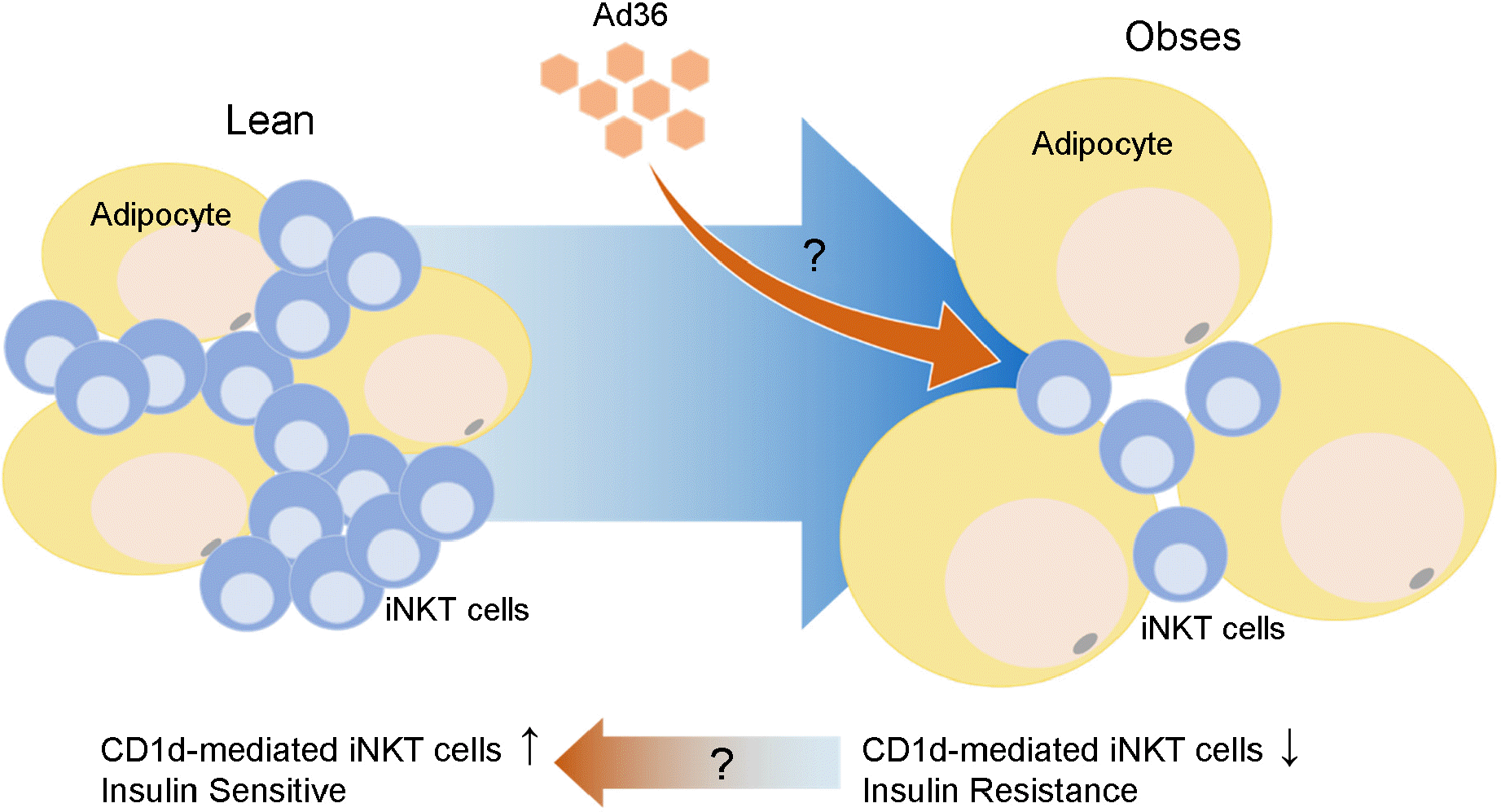Abstract
Obesity is associated with a state of chronic low-grade inflammation. This abnormal inflammation state may cause metabolic dysfunction. Many studies have supported the claim that immune cells such as adipose tissue macrophage and invariant natural killer T-cells (iNKT) are related to the development of metabolic diseases like diabetes. It has recently been reported that while human adenovirus 36 (Ad36) infection is associated with human obesity, it also helps to improve the serum level of lipid factors (glycemic control). However, the detailed cellular mechanism remains unclear. This study (The Journal of Clinical Investigation, 2012;122:3343-54) showed that iNKT cell-deficient mice on a low-fat diet used as a control for high-fat diet boasted insulin resistance phenotype without adipose tissue inflammation. The results of this study offer insight into the possibility of a novel role for iNKT related to the improvement of metabolic diseases, especially insulin resistance, and hint that Ad36-induced inflammation may be associated with iNKT in adipose tissue, while also playing a role in the improvement of glycemic control.
REFERENCES
1). Schipper HS, Rakhshandehroo M, van de Graaf SF, Venken K, Koppen A, Stienstra R, et al. Natural killer T cells in adipose tissue prevent insulin resistance. J Clin Invest. 2012; 122:3343–54.

2). Hotamisligil , Shargill NS, Spiegelman BM. Adipose expression of tumor necrosis factor-alpha: direct role in obesity-linked insulin resistance. Science. 1993; 259:87–91.
3). Wentworth JM, Naselli G, Brown WA, Doyle L, Phipson B, Smyth GK, et al. Pro-inflammatory CD11c+CD206+ adipose tissue macrophages are associated with insulin resistance in human obesity. Diabetes. 2010; 59:1648–56.

5). Lynch L, O'Shea D, Winter DC, Geoghegan J, Doherty DG, O'Farrelly C. Invariant NKT cells and CD1d(+) cells amass in human omentum and are depleted in patients with cancer and obesity. Eur J Immunol. 2009; 39:1893–901.
6). Lynch L, Nowak M, Varghese B, Clark J, Hogan AE, Toxavidis V, et al. Adipose tissue invariant NKT cells protect against diet-induced obesity and metabolic disorder through regulatory cytokine production. Immunity. 2012; 37:57–87.

7). Brigl M, Brenner MB. CD1: antigen presentation and T cell function. Annu Rev Immunol. 2004; 22:817–90.

8). Dhurandhar NV, Geurts L, Atkinson RL, Casteilla L, Clement K, Gerard P, et al. Harnessing the beneficial properties of adipogenic microbes for improving human health. Obes Rev. 2013. [Epub ahead of print].

9). Atkinson RL, Dhurandhar NV, Allison DB, Bowen RL, Israel BA, Albu JB, et al. Human adenovirus-36 is associated with increased body weight and paradoxical reduction of serum lipids. Int J Obes (Lond). 2005; 29:281–6.

10). Krishnapuram R, Dhurandhar EJ, Dubuisson O, Kirk-Ballard H, Bajpeyi S, Butte N, et al. Template to improve glycemic control without reducing adiposity or dietary fat. Am J Physiol Endocrinol Metab. 2011; 300:E779–89.

11). Na HN, Nam JH. Infectobesity: a new area for microbiological and virological research. J Bacteriol Virol. 2011; 41:65–76.




 PDF
PDF ePub
ePub Citation
Citation Print
Print



 XML Download
XML Download